By Yemi L.
The famous British philosopher Sir Francis Bacon had a Latin saying: “scientia potentia est,” which means “knowledge is power.”
Curiosity is very powerful. It often leads to knowledge.
A few months ago, I was curious to know who are the people that lead luxury's most valuable companies. I was especially interested in the women and people of color that inhabit these boardrooms.
This curiosity started with a dinner party I attended in London, where I live. A conversation about women, ethnicity, leadership and salary became very heated.
It made me think about the industry I work in: the luxury industry. I set out to answer the question, "how diverse is luxury leadership?"
Using data engineering methods, I analyzed the LinkedIn profiles of the 109 CEOs leading the most valuable luxury conglomerates and brands, taking into consideration factors including race, education level and age.
These executives hail from LVMH, Kering, Chanel, Richemont and Hermès to name a few. The full list of companies accounts for more than 50 percent of all global luxury products sold.
The following infographics, published exclusively with Luxury Daily, share some of the most jarring insights from the research.
Luxury’s C-suite is mostly male
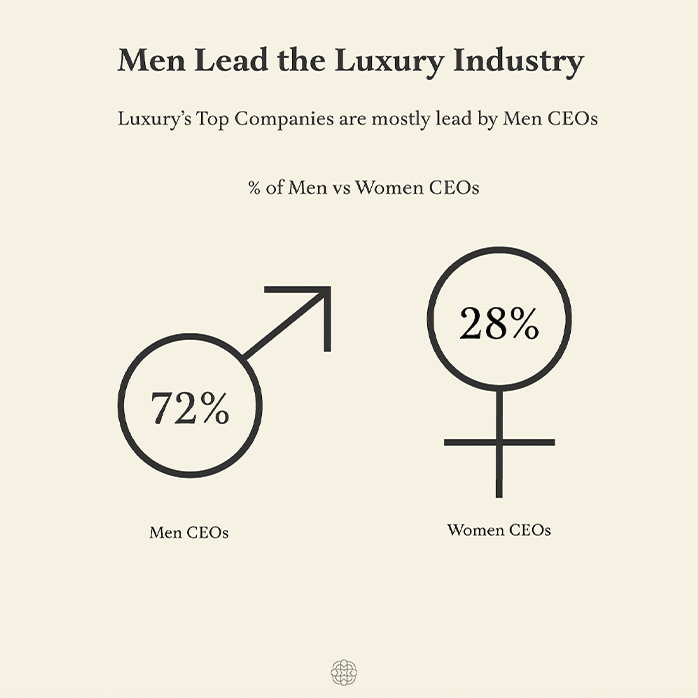 Image credit: The Fresh Kid
Image credit: The Fresh Kid
Of the sample studied, 79 CEOs are men and 30 are women.
Compared to other industries such as oil and gas, where the differential is as low as 5 percent, this ratio is quite imbalanced.
 Image credit: The Fresh Kid
Image credit: The Fresh Kid
The world’s most valuable luxury group, LVMH, has both the most brands and the highest amount of women CEOs, counting 20 in total.
Kering currently has 4 women CEOs across its portfolio of more than a dozen brands.
Luxury’s most valuable companies have the most gender-diverse CEOs.
Luxury perfume and cosmetics is led by women
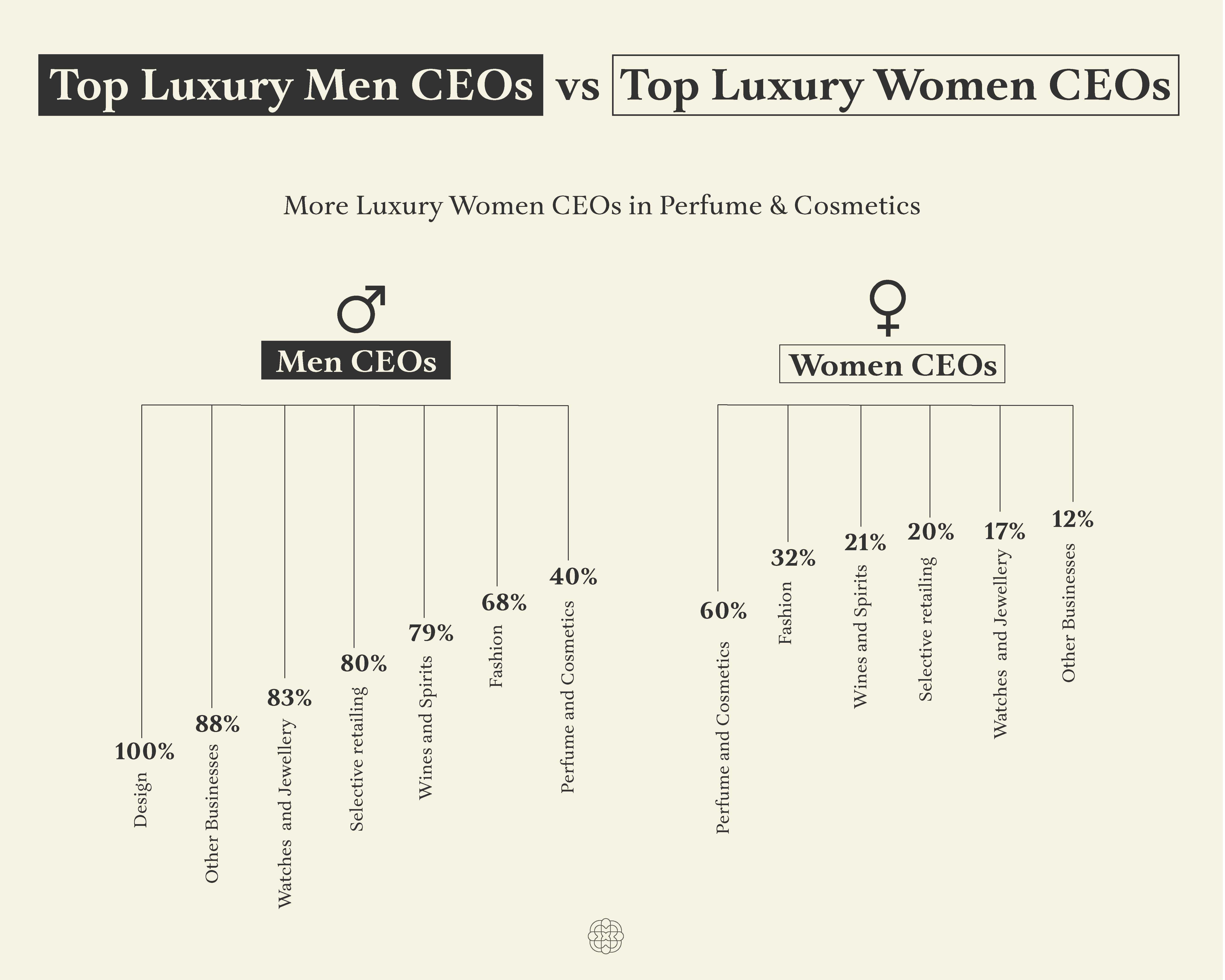 Image credit: The Fresh Kid
Image credit: The Fresh Kid
Of this study’s women CEOs, 15 lead perfume and cosmetics brands.
When I started investigating diversity in luxury leadership, I posted an infographic on my LinkedIn profile. Many of the comments were around people of color in luxury leadership.
The standout insight I discovered is how few people of color lead luxury's top companies.
People of color are underrepresented within luxury’s top ranks
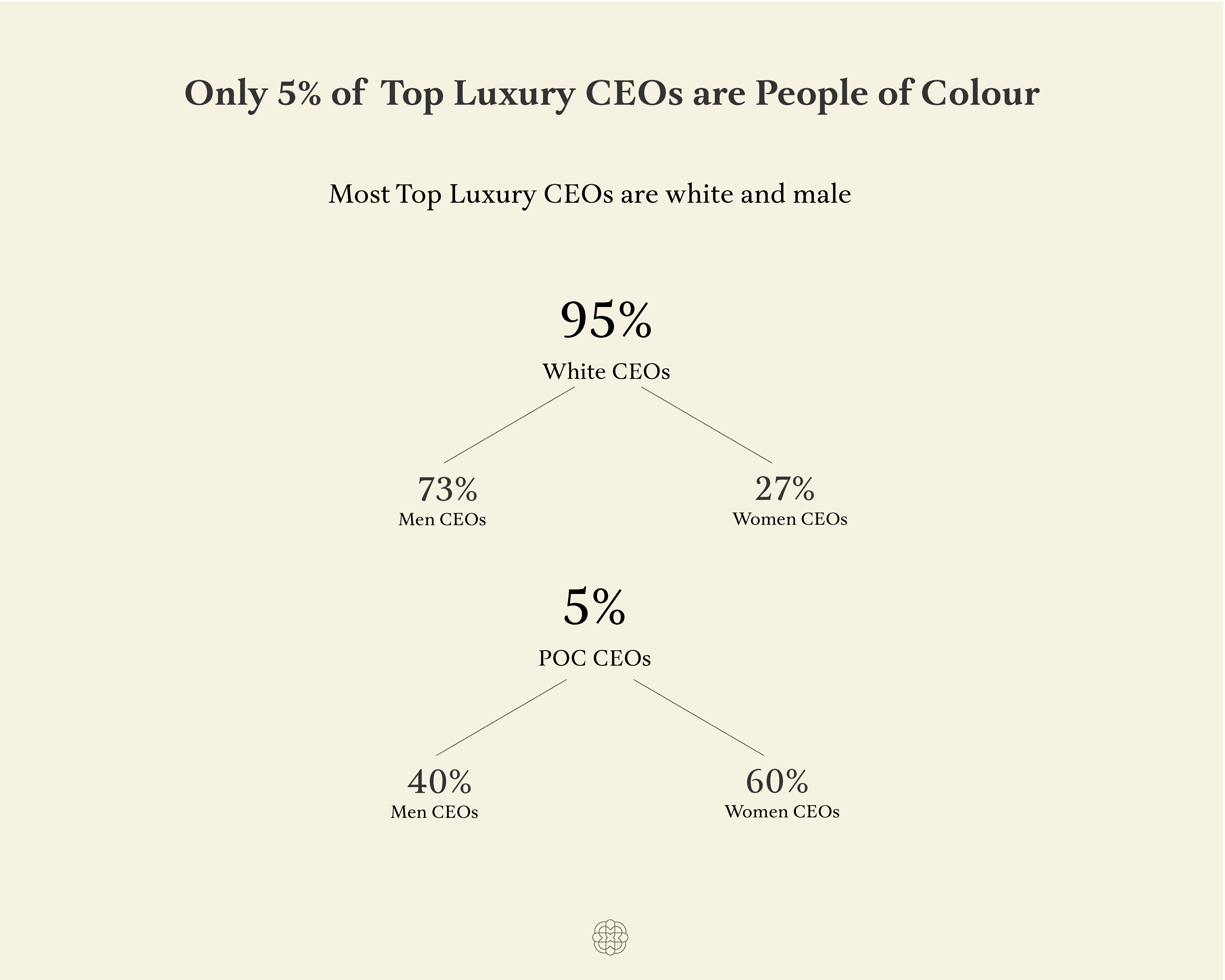 Image credit: The Fresh Kid
Image credit: The Fresh Kid
Out of 109 luxury CEOs, only 5 are people of color.
I believe this does the industry a disadvantage. It is proven that having ethnically diverse leadership statistically improves a company’s performance.
For instance, with China being the second largest luxury market and a main driver of luxury streetwear (a segment additionally influenced by hip hop, graffiti and Black culture), brands would benefit from employing leaders that look like, and can authentically connect with, their customers.
Over half of top luxury CEOs are university or college-educated
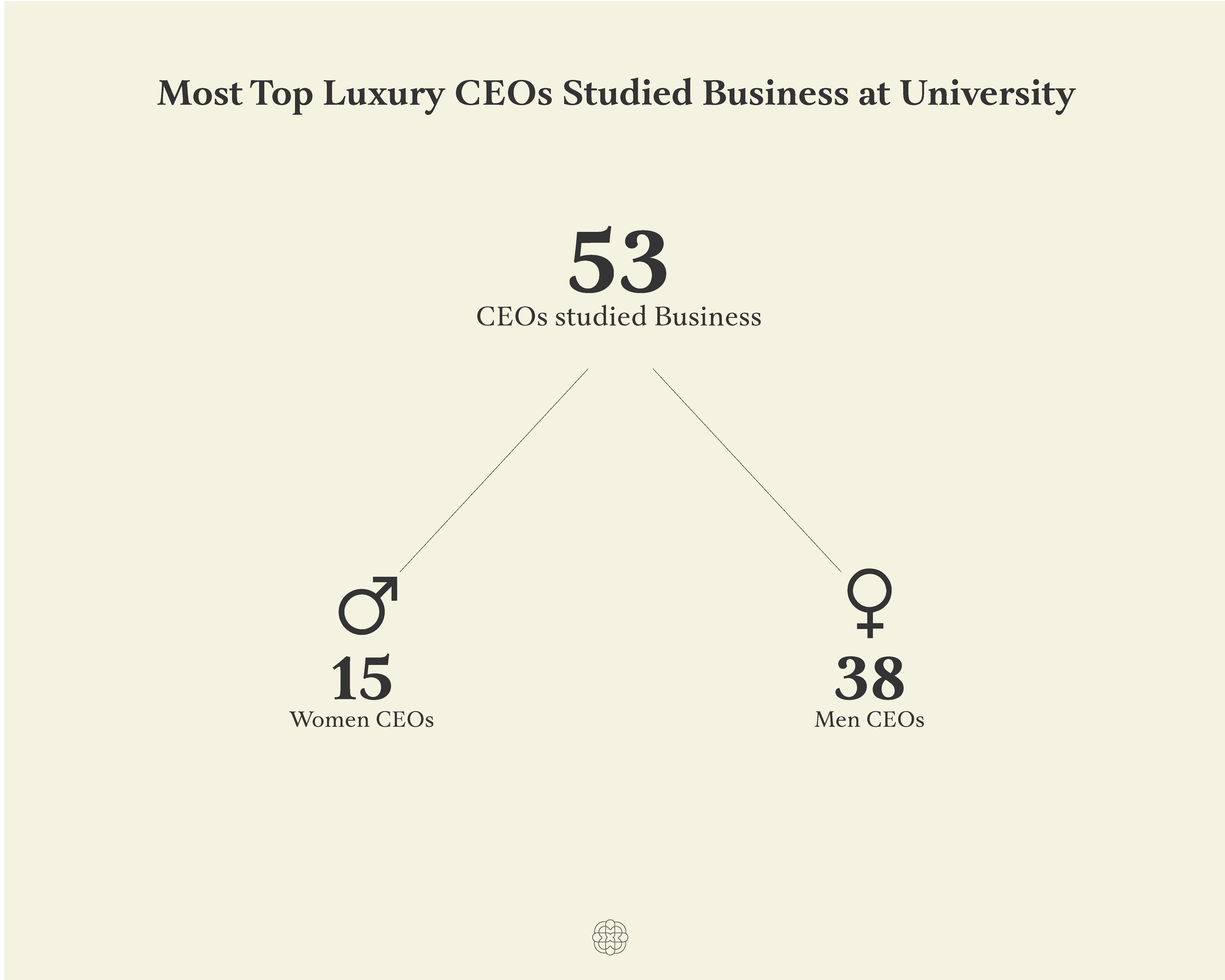 Image credit: The Fresh Kid
Image credit: The Fresh Kid
By analyzing the LinkedIn profiles of the top luxury CEOs, I discovered that 89 of the 109 are college or university-educated. The most popular subject studied is business.
This is true for women and men CEOs, as well as for people of color. Only 11 of all the CEOs observed studied engineering or technology.
As someone who works in digital transformation for one of the world's largest luxury groups, I see every day the technological issues luxury brands face. Over time, I expect to see more luxury CEOs with a technology background.
Luxury leadership is more diverse than most, but needs to be more curious
Enhancing the boardroom with diversity of opinion, skillset, background and life experience would advantage the industry’s ability to solve for a wide array of challenges.
In my full report, which you can find here, I discovered that luxury leadership is much more diverse than most industries.
But if luxury wants to continue to thrive and grow, it will need to be more curious with its leadership choices, making it more knowledgeable and powerful.
{"ct":"bmRm\/npO1m8eKwiF9q4+7Grz5m0uIg+w5MTIzqAzwq94Ob+LCugXq\/14vHYaXNH\/0vNUJB\/vvOaFmiju\/NGLZLGj9HobuDz6CKzM2ANYGTW4sL4ggRrHXB2l6Pov8l8ynOW+PJCP0CHdtY5H5JzQCHQ+VOz5NtvvrPVJDCEdR13hIjMSZEGkov8tMPdAze4jKzNeUuV4FwH2dyvuKMVT+JUunkaD58j+HtiRtLHubzKkQkLiLlWIAyalMMwZUxLplM1LDHTOSsME1pLNT\/jnbGBRmabcL2W78kugVPWWDiRGXEnRpk3oMPdhZGeVIse1G+rlvKLKABLIDwPGC6HVp3\/5P9\/oIu3ifMVypRWXzn10THRPTCo\/6mzblTNkBIWIG0q6+HujgxdAh8yh\/R22qJ3V7QHkKGTIqUMMuEO1E5uajkok7dlBMR67tKF01UXhVdcfd12MZpU15Uq5rUp1yI81bK9WqkAXV57O0boJE9H24nxbPgBzlFBYIYDyEbHSocHc7kJFm67Dl9cZH6xDdSLIikjFGWctRAoG\/BF6RqSd++NPab0IOLVlhnUfNP4t35E1XpBaY2o90qaSM\/XeL768P8Fobtk6iinDlLqWsDG+NN6HyKKyuxAxgRwrQR33ADGbqFRkqbNoAx3iZh5lcIEb0fbvlenXfUvvQFDWQUK7OqeG8T9ZdAQDbO1MtOKNPp2RIbLsoYxy0kHKAoFy\/O\/uN7rT\/cteqcUKxhqSRBp2DBtWVKTx7VZp80bEVsnOOdqpHaB0ilGhjc6fI3b0mDCo1PR7lounO9hxBB5MIuNhLc6h3huiiPGbzUROiOE26He+cADbNyg2jyNJWwYitjGo1uEB8pf86WI+6T4lA9WdoPREcfdyvz9DHgNloQgtnQG7zJ2v\/ZDyAIzfpWolOks8dSpGfjfdnPXsbA6zbdBSiTfs81eL2iZuNnGR10o7v0iKNa7EtbOOpb4r+PgfQS7oc9P42Orqu2hiAW+CvGM6Bbwjo\/jVcOpLZuSqHTc0XWutexJMOIJduceXzCDINdhOFkJlzL5Gv3zkr18DwReMbaA4jsnp8QXTuo8O3ULSNhKZYfuZF21VLzru0q8wJQCybBWoNCg+uMDug\/CLFoDUmTupMU2o3\/tr5JliV9H9pg9umufQFud1LFbKIZPRWOUAaVR5g3hxRUe1ddtGSU6YTsXrxRgDlpjwItSKsaGSJtm9XYLwFqZFqawCtw8YQjtTOCpRX5IU7klUC5cv7UYC5EjLymcGQGB0Ik0tHjHvrEP4fsij7Bdiqi77VrFH1vxHScSmdVg\/SKzxuWWgCPnxYrD\/kR4P1RvsN06MlTuHRlWaPMwpLmxL3kF0c\/uBZiidW1etX1talfW9lT+YjHIj+tpX9PImymO\/74bQNNaeoNE8I21PUbnRoPUIRut1wE0ny21XnfmBKOvHI4p39mMFju5U5Pi3ICudxbhI1PFUHkwzwhwlAhDsN6UzvBJCmNWLX9gAmm\/n6Hn6xOQb0GzXxb+v0YSpacs99OXQcyLFvKVDtJp1UGAxw4Zxa53F64xlSlYphNonEW3veFZyuJ4yJOni7cK5AfGnSnvTilYVQU3+WBMjMSbGzV2gST8rEN3TCcJERIsXCepwOYxnH3OaA4jktW4O10wMdOkeIzaaDV3LrE5cz1FzY8mJKPbOFIWMRVFUKGgJHV0PaG+H5U0oLn42sQQM9QKj2vGzU3T\/tVSR3l5MbICEtEc5omgNuzMMLWixUjYYZIuNOGZnEDhgi9nXnd90CKWB8GT7iZiz+ogQbqS2aQGEzxuGCWGvrTzDf2ML3brm17wIdIbHEEcInIQxX17i9GzxXvOwefU5l4+Ti9PN43N+gPY1+QTcK13ZtbkMngrNSPtrlCIVkY4Vqe\/3IYjuqzvU\/aJAFky6p3wmQtP6KyZfLFgsQ0vTO9haHvUGBMfopnLQ4a0liRFVaw899khCWStCRA96At221NyMpwpSCpf4fGQ+52sMO4p2GT3pZROgzOHbWcQDZX5gHAGpf5YGopZ01ziGTD5Ks0WOmEB81aE2bruAudGSfuFWBhPq3imWaM2ClNAHYfRbUZ9zKliHEihH5O\/kA2sChKFAcSuN50GyTQJvrYgatssX+F+v9HxObJzQPFtI5G4WJP4xslftZ1SAUUawuVGQif1jsq3JZmtcSQEYZEf0tw9L7TpsPz7I70S91ywpcMHJW3Y8u92Wxf2WHshOfE4uXxp\/AEl8NujdKBgID29DLwL28mZb1q8j5m8HWTDv5J2DjN9XbG2hsEdUg\/fzfD6CkKiiLEjIWUbJPpBhN5pBVIlnlYzoYEoiNeTR8IgxP\/4yxLbPb5XvAgFjObZForA+960UUso47iJWQEhpL3HU24ysiNsqoLzIIlulWcNnrG2bLDIv4PA\/Eua+AdAHn57wPTYx17Slcmh9QfyS8UY07WoWY234YmQ0QgM8jOwItfBQn2s2vFcIFdYyw0yOdiielMb+jut29yieTzZ6FRN8jMepYrGspU9ROhUf2tSsjvIXL5OPoPUDku7YBrsnketSkYMXO3Gne4bEI8GYkUcv\/IAI\/rZUNkIRwULeyuaAOVzSHm6csRBBgxuONHVnvm4tdZftpLmgZ5wJSpZBwAlBbJM1X5wjZBlurhCoXemvlaxddHPDjgzughk+NS\/8OHL11agLhLcQZidHzz7a+ayuucpxjGuMGtzsSK6u9fQXOC51cfpsMSu8g\/KO1ykeet8\/Q54v2zzd8SnOct55MADLcvkCC5LWckFvVS28oSuKoir7pobnncw302sqaQEWW9mLVsvmySJk9FvIu++DVpUHg2nDZmrktIimX1SbcokLnB+dbTVC3S1hGjMUdTffija3xmGZkTGoXA4wdzMoNdslmq8PKjWwQz05b1ft21cmUSLkbjMjjJ7IedEAzCfO+ebBvY9\/hIOlW5cudxRbDJJB2QSLiOtmtM\/3vn+VfgNkUuzGiX5I+aMPYDvWoz7klhlYyh7NhycUrNlhg\/SWiM60+hijwGC+d8PDG4rwLBZgM80KBgB+Ig2fq8XsfeKBaFdapsmfnZxfaGZjxWuf\/p4NSgDLKFlC55QWFH0jFv3AkcgEfTdbpSiUayM9TGG4+NgF9SwB+ox9SBV8egOSfzM6TnkzRpdCeWof1vgDIbjHieGms+KZdfZY6XP13U\/XpUCcKYybq7o+fXqAgKkZyHHt167VXt5EvlQrSSXKUPuMb8plYEtRZhGNGFj4j1nY3GKyyGi\/A6mNxTyAn2465j8Cjgj7Tpu+23db1K+qb2tw5Gk5VTWqPfF6v5kdV1JK0aDyyWb4q25rHZFPIxvVkcUj\/Tuh12Ig96X5AiG\/dxhtFHXwYrlx0ZOnCnE5zZXK5UJ9po2Zv52nnF1d\/8Ir8rGuCpfXpGskFCaiZ4+YpGTD0bNEaRzy+EXSESEvtm\/J43GAHFNPuIUevOgLRnwGPK6EzB1aMRMiTFKtl\/taKU6tcSS3U6jYaqr8foW60vygcps+tNNz80rLvpgGeN8W26FlVhimOYM3nC01B0IejRVXGJHSqlNWHZ0GD\/SCH8uHSBVHj2cJCcK2LSICSo7DEaKg+8+1ICDXd725f5pzjlwwc3AvLz5f4w1f6sRCqe+fz55x5rgSt6AfDteAZa0p7jzj0pAwix1Lgre9xeTrG3vb+IDCLJFNti16ixFJynOJlSTLos3gIlTkQAvKwGreYiiHO29TV5s4jR2f93UX0RtGJJLeZAXcbYiSUlOuSkPgcgC0g789JArZ4QoU\/OIX5RL4\/1gUvutQ6qkw9El71B6Xm+VxbG+y95jUXpUGT97qYnDKWsWnY0blH5ucejoSEe5Y2KGQJTHziNyGPY1j+J9eBvWy4zpPXZKPgFRAZSthnUxSn9qr\/gIBWjXo1ShHGlDZGvrdVC\/s81Mk\/62cX8ET5DmDz7DbWPM3iBFewNannuPr\/k7ty6NBTgs7ZduUrXiTkwk01+SNnO5xkXdeAjwzlqJOmTBF22Q6z0C0BCRhuuFVdCrv84EGoqjQ\/kAuQp8hHm3P2I6M7n\/VO24+meeaCvvz03zpPBJt501Pv8bZHtFOJfN5xv+4Gk2rvsP\/xWRwXqeT1Zlw9suThBTxwfIpwia7T9J+x3\/GytgLH45du72qyrsdcaUKMY8hrVPV5Xipr3FvezvaiHmvJ9otggjj6Pk0iVbd7aiy\/\/cLgpZ9FH3t19Pa0f1v\/EnWomu4iBQsvE3mWmMoVuQGr8Pny6qRo70N847jsDyAQSAALVvTmYX8yKhu8jLfUVVSaEIZtCHG9zWLcHordgyGcfN1YJrBIVsil8kns3Vdh16it+5jOL0YOFK6a0O0nPjrz0sN8VLLn14JZHDJMrk83ZdAGHAwGRwT1V9YHEVZR179apriTXvdKVNDSLtGqBXmxxrzK0GyhBmmyeAC8djyB9vaKrwTqLAL0bQU0vM+71kYNl8qYQZ+r\/yT5DWwl+MhOPsK5WXpR\/MRvtVenYbWLxOyCBioRGezSVLjNjO37s39Mh2YuOw9L1IHXOvLboVwbgAEqKZ0iW97WiZIOVouNDJPCOSGhbmw0FL1A58r48BgPV\/LzkDdXG6T2VXk3bYq7hP1dpM61SzwI+4IXWyI5jn6Ui0IpDPG6b1L7mv\/7LAwq1J1QmE4zkshB7c4tABlFjhE+92Krels2LdvhMgMfrt27MDVOnf6v5IZYgIObBRm+9ykVvb1na8lwdhLZkxA\/TwZfxC2MT2pZiFxOo76wyfCg6nDYF\/2IFmffpzqJ3WATBQ4dgldBaVLdweMC3A+g99fGdgd2CweCEIM7BWoZ7teKsAe3oC5dSCkV0AGWetQc3MwNuB7AruxdIjuVmPPQYIuaYi48YeDA0nwk8NsX3WltntPeAbedadoa\/a9tVTq\/ykGTePDxJKE2HcAb99FmR9Lxf3UMeWimXYn41ExNx9MaIqZam7GhV\/Ew9XjaDeo1tSHz7eDYsQUD+vgwyXeJKudcWU60zNbEIq\/0aMJHGBVq5AYE1xxWCzD1YUv+K1MU\/zlf4w6NXHdUYUbfROCawQl7kafwe8Y4jrzC\/wtGXU6vqvc+TGHHP2Ml\/uUMCrdn6J9yLutQuM4l+m5zwBt9ZIVtNqSCs+t0E86FOnUZfA2phegCW3fkAW\/M8WdA5s078WnLIFlioVKoKCwPeRv5ojRYry4+eEMN5H5n5ihczoa3F7wLeIjzjCTKSAsWPsr7MCXv2laBsH8ZZ8NMeJEGOh46BdsIFS6DrsJTKRBeYvwTar7lCmwajAWujt28IWEnQ4YKa\/OKlh3xTQhZAxk7IPL72pwBUmLbM+12bBXr9hqB0qiBibjjeczYpATf4xRgfKzq8GF0i78jAwXThGyEEWdwqn3SazuWllY8ZIN44VLH9voz\/XFfenp65yWHIn0tA9gDwrb7BQh2YnGd5tzT4EOfKMl7rIDmBxrQN8YFALxQQYIVaaNzpdCD5sK2xlYlJW7qseoeaDtmC0I+FZUUnBWqDjZ8Ml+7hPT4qDORVPtDbJkj6uHmfaV9mBlzG9y3cp9InSx4+99mBzEkQCU\/Ckfy6TMr6f+bBOoXeyKGMEfQzTJGUlceQt2mPLKxVQlm3qrBbbcTnLbyXa6oWVnGopSH7lDjo8ja09hoJY1K10WxY0Gex3zLaN2hc+0XmVKtiEPolyGN6CrRdJroi\/TttijVc0Xdl+\/L38N7Yc6wKD7XpC8f+I6A8nV3L48JTJOlBG01uJOErlHP4GoRjvSMJZizAFTmSsTvWYDL+UNIqPmvOxj08QjgS5TSf2lYKe6RV6e\/1YMAXm9ehOol5YOSW5e0hK0v2v28YE2Z7V3B4XsrlSEt3l4OuSopiDACgHVSdU9mwxrZ52bM19hRZoI8ae\/XFcJfiiN7zV2uPLiRSYWaP0i7fbwW96SNAtMtUTBoF7Ib4B64zgLq5FG0lVtnoTxfbSh\/Du+L9UxftNBye8FPHp7aaE3C7ObhcN7lEcJOHt87wGpg\/HwFJiFPsf\/0zrN\/KAcV0LHDcJxzROXXy+u1Bi0qcw1i0WkuEZi1SDrNujOf3yIqbxsbzD9brRbBDC9nL6LTeuYQn5pxvL2CkQUXG6HXSvt8tnNZu1N7Btmxmlgq1yz1lUpQ\/ipY7gdJU3jaXUDgono6yS3X+9+OJml+WznpcQ5PK+drQNu8jfm0\/g\/Ja5xb3icaG3XyVRDFnsUJ9P031q77WkIpitEFFoP6Ym3onvOcM46MpTGT7ccMg5J28XWWGlMBC6jzqSTEtTtA18VIJq1ncCejw10sovQj\/IBZtwqj2OBccq4tPs0knSAt0YW45fwFlDsBWvr3u\/Wo00dQyCVd0h+KQIauZsjQXkiV9wZwN6ybim0P9nU2Jq4HhYG\/V6uLXtVP7XQHRp\/jLjrtomFlHmsfi57FyZr\/rFYBRZLsp65QR6bZTzXHRYLV\/aVcV39ehXcP5f0TGRNmGnBOdWHDBKbLt5sObBVWzYlShEF\/jR83ffb4y2Cq05vrFV4UEkImfNoGKcnIWcMR2fC7VXruwpJwseAZxprhsp\/sqyeKbgoonWbCJH5uNcE44Y1IBE2oJFgbfCYDcVpHbudMZNVdi53tZIvk2UK0DGVXUtVdBh4HqUHxXElo\/UpdPVrANrRmziFhulVuEysKauW1fcqThEAeO5C9G5gLus0We+dS2dklm+w2YYWO7qwf+kYRbC0KCT8VuL65brSDCQm5zqvZ9eyzF0Hbtb99giQnbR3OlQj77tNWkReP2tqSr7aHkpUv6o+vY59y2xmi0jvsk0lPuhjNU\/vnFIMK9grsRVpAMn5K4dTyMG8PwtLVGJdpZIK6zlZjENNKwHIlygiPXq0aRxZEH1By1YN4Ul9d3rB3ZCJZvenj0mVsnus0S9lMpDKLmr4Kq7khz7ceoU8sk+yd9xjaNJ9da\/pIcC\/TkVkku+EPWNVsRdRovB5FzQfb5WB7LoY0SpW1NXDqoUWIk8IO4+Eaxq9rM0PdnmkqSDOs3A2\/WRGiV9HuukPJ2bFVoQXS9TCwuQ5iBah45H\/E42gwnbmccSX3h5v+Mu5QgEVUxlo3dLCav7+RysB09hzOWJhaQ5Ybsk9acnVsUV7d2VDQWoPG7zLUyuuEYm\/OvOa5YFQBddmFPBM4TU7kT95l8+IT9m3ZL+nQaQXlpF2i4rTwrAiAYYLVi\/DEvy4G5YZFtkfC\/1PadxOGlszvI8KDLMRc7nZYUKw83v76sacv2oFQ+FcFKqbcvZCQ3+poKNKO7v2f0yFAkQwKYcLYSxrdMUUxO6sUgJhOI\/FRj8whPaW0IgRfa8dM+R0hXsG35LVzE8nvk04zAl\/AAgJf07+SkUOmA7SLTf40RtzoHvpiuW4IaevQl\/Vfb4Rm9FCJ6anTdXFzQiDAyTndpb0iIQV4XOb9l2Lxbtf7LemWo\/3xCUs0xoQOV53jh4BRnHbXCtYRAyieX51HbVyunoCxqvCykCIjYXPgjCytQFYmU3UElUrial6Xzjg\/4IMVBFx9savcuQUmZbzK5J2iURxgWY45Xq\/T0znaH73e8hXf7ncnpBiyDB3I1L7pYsjhVr\/uyszBuN9feWlq1rykm\/pcDA3HTvjB7f7PlHT+UPzB5\/7c2Bc7t6URgV5W5W13kO7t7gq1EwdlsGPLXx1lYyWuj0+QsPeRV9x2qQPM72osNCFSVuF6kxivthwRFHTIVvOBaMyNcrFDZT3NHkfTKSgP434M4HKfBKYwXtonvHizFRn20SNP49P80YsrMI0FLHIil\/AHUhCWXXS\/p02kmqyKEexuFiWdvCA\/Omj1Vh3GnLHpHnxwgqww+ZA52sJ13c1NeZlRNViFUOqxI1bkT2i198fFs9E1wvGlxdDiTXeNuoL5AluaIpKWkaNYY9jNxjCErozaocBA7GexlFhMswCB0XbJv4zOMgZCEsRMJQPYMQ1TH7y7Q2WrIlO3xYk7aEn3JAy1N9DNasSDYpQvVQaTb6UXTkhQvoqIR9YuwLTGgy537XJNT9wJahCmuKD4CeApaf+ET8RiXYgJSKPC6ArXhZt+Mmh5MPc8+Clxvjv7mTozz\/dnDIWVI04LCe11hIy5G5uD1HNJlqkH1vfbCTOVgm9qeS1eO7VXHAI6zoPJmYTcC99Kijot\/owTqSetn4U3eGWNRheZqLOGhU2KleDMUGwa0schk6FMmlmLWZnKSlXDn+KhxyCTEk4+Qdk072klT+U+XGskGQpIka3mDRLVvSBJ4qv2XcXBP\/5tqGYatJu2C8O6+nmfecanNhhd1G32MtdooM4wjr894Iu4xGQ2J1Slcs9qT7BIcQBEVPDYSynEL7l8uBn+Nv13wAQKRZfFOG9FisXROeYDGytT7Rn+SmzIFf66xP\/1bN56fsz3iBehQEtv5WuuLYY1m3RM\/xRgf9LE0DGseb2l97k36Tyi3YOVsfWVSB9\/IhIm0ZhWQfKFZuj0qjwvpfXueO4e5wINsInZDp\/\/s+7ckHijV7KQa1IBsugYOO\/KJU7lhbhdPxIpElhcv6VS6SbEB0w0ghYc9Z6Wf3ccBcQtJUh0fv6qlxfOLI\/t4qg0x2+Kyf\/PUld6g==","iv":"77c733582bdafb6c28ab3f817b365235","s":"a7a8b5ed18c26163"}
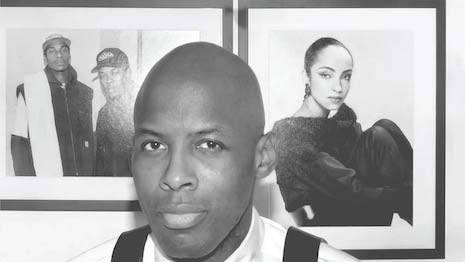
 Yemi L. is a data analyst and founder of The Fresh Kid.
Yemi L. is a data analyst and founder of The Fresh Kid.